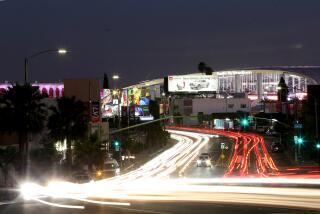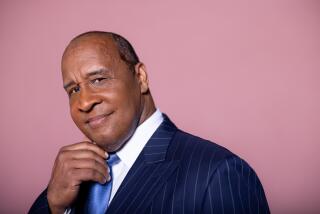A town that made a difference for blacks
- Share via
IDLEWILD, MICH. — It’s a 4 1/2 -hour drive here from the South Side of Chicago -- which, in the bad old days, could seem like an eternity to families seeking a vacation from Jim Crow.
Before the civil rights movement, black Americans weren’t just hemmed in by Southern legal systems and Northern ghettos. Travel was tough. Hotels and restaurants were mostly off-limits.
But this north woods resort town was an oasis for African Americans from Chicago, Detroit, Cleveland and points between. Under towering evergreens, blacks could enjoy ordinary summertime pleasures that others took for granted -- boating, fishing, swimming, hanging out at the roller rink.
The era, which included big-name entertainers at local nightclubs, came to a close when civil rights legislation opened motels and resorts to one and all. Idlewild seemed less necessary once blacks could travel any road they chose -- including one that now could take an African American through the front door of the White House.
It’s an idea that some longtime Idlewilders can scarcely permit themselves to imagine.
“Their whole lives have been defined by wanting something: simple equality,” said Mary Trucks, who heads a community development agency. “They say: ‘Is it really possible it’ll happen while we’re alive?’ ”
John Meeks first came to Idlewild for a weekend in 1954 and settled here permanently to open a motel in 1994. Elsewhere, he experienced petty insults and gross discrimination that leave him “excited but a realist” about the possibility of a President Barack Obama.
On Meeks’ first day as a teacher in Detroit in the 1950s, Meeks sat down at a lunchroom table alongside two white teachers. They left.
When his car broke down in Indianapolis, he had to stay overnight while it was repaired. A mechanic told him about an African American woman who took black travelers into her home.
“Back then, you didn’t take a holiday from Jim Crow,” said Meeks, 85.
Except in Idlewild, he added.
It was founded in 1912 by four white couples who had a hunch there could be a market for resort property among African Americans. They bought 2,700 acres around the shores of Idlewild Lake, in northwestern Michigan, and advertised lots to Chicago’s black community for a dollar down and a dollar a month.
Among those who bought property was Dr. Daniel Hale Williams, a black physician in Chicago.
He formed a partnership to build a lakeside hotel and restaurant in Idlewild.
Anne Hawkins, a Chicagoan who has been spending summers in Idlewild for 82 years, recalls seeing Williams when he was old and she was young.
“When he was very ill, Dr. Williams would lie on the porch of his home here,” Hawkins said.
“To a child, he was just an old man, but my parents made sure I was aware of the contribution he had made.”
In 1893, Williams performed the first fully successful open-heart surgery -- at Provident Hospital in Chicago, which he founded. He died in 1931 at his Idlewild residence.
Hawkins’ parents built a home in Idlewild just before she was born in 1926.
She grew up shuttling between carefree summers here and the realities of life in Detroit, where her father was an electrical contractor.
As a teenager, she and a schoolmate went to a Detroit restaurant, only to be told it didn’t serve blacks.
“We broke out in Spanish,” Hawkins said. “So they had to serve us. We’d studied the language in high school.”
For her generation, the beach was the teenagers’ Idlewild hangout. By her children’s generation, that role had been taken over by a roller rink.
“Now, someone will come knocking at my screen door, saying he knew my son from the rink,” Hawkins said. “Because of segregation, people used to come to Idlewild from as far away as California. You met people from all over the country.”
And sometimes you married them.
“Ours was an Idlewild romance,” Clara Thompson said.
She was from Chicago, her late husband, Floyd, from Detroit. They met one weekend in the 1950s at the Paradise Club, a long-gone Idlewild nightclub. Thompson, now one of the town’s 784 year-round residents, thinks of herself as a newcomer.
“But when I first came, I started listening to the old people who have since gone to glory,” said Thompson, 80.
There are only a small general store and a bar left in Idlewild, but Thompson recalls when there were so many businesses that a pair of policemen were needed to control weekend traffic in the town center. Idlewild was a linchpin of the “chitlins circuit,” a round of vaudeville venues played by black entertainers.
“We wore our furs for an evening out,” Thompson said.
She and Meeks, the motel owner, have been promoting greater awareness of Idlewild’s role in black history.
Mabel Williams and her late husband, Robert, wrote a chapter of that history before settling here in the 1970s. She came with her husband to Idlewild by way of North Carolina, Cuba and China.
Now, an African American is running for president, and on a major-party ticket. Could she have imagined that during their years in exile?
Mabel Williams was quiet for a moment. The sun was setting over Idlewild’s peaceful waters and towering trees.
“Well,” she said, “we always believed that one person could make a difference.”
More to Read
Sign up for The Wild
We’ll help you find the best places to hike, bike and run, as well as the perfect silent spots for meditation and yoga.
You may occasionally receive promotional content from the Los Angeles Times.






